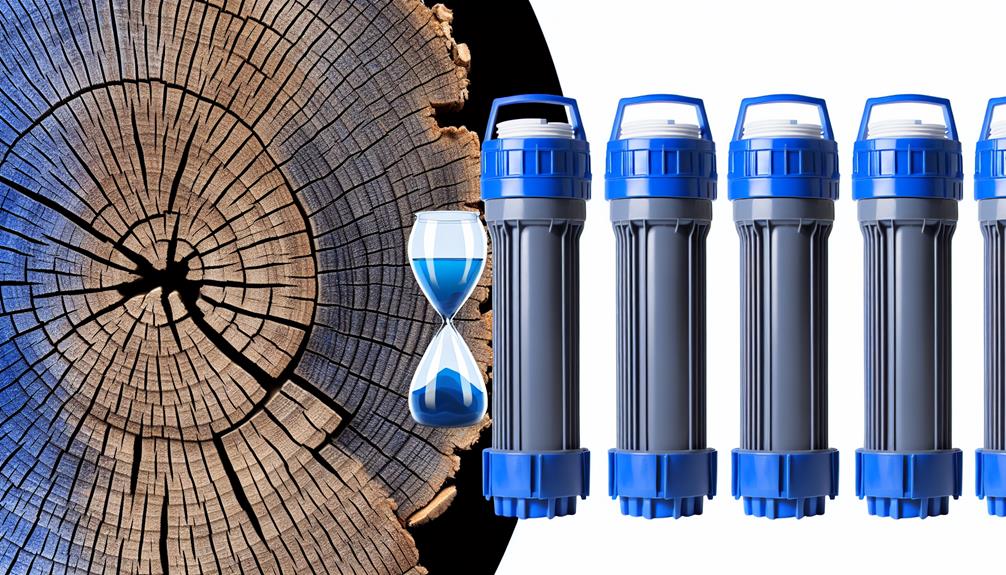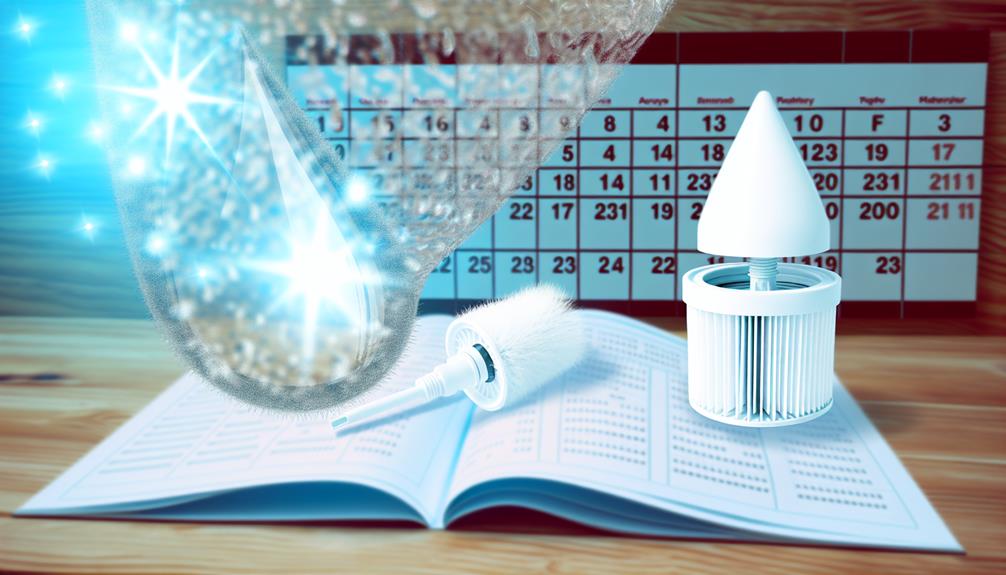You trust your water filter to provide clean drinking water, yet neglecting its maintenance can betray that trust. As you go about your daily routines, it's easy to overlook the silent guardian nestled within your kitchen appliances. But consider this: when was the last time you checked your water filter's condition? The signs that it's time for a change can be subtle—a slight change in taste, a decrease in flow, or an unexpected odor.
These indicators shouldn't be ignored. If you're questioning whether your water filter is still performing at its peak, you might be surprised by the intricacies of what affects its lifespan and the consequences of turning a blind eye.
Stay tuned as we explore the telltale signs that it's time to replace your water filter and how doing so can safeguard your health and the longevity of your appliances.
Unusual Odor in Water
If you've noticed an unusual odor emanating from your water, it's likely time to replace your filter to ensure purity and safety. This distinct smell can be a clear indication that your water filter needs replacing. When the quality of your water is compromised by the presence of contaminants such as chlorine or sulfur, it's a sign that the filter is no longer effectively removing these substances, and you need to replace it.
A strange taste, particularly a metallic one, may also suggest it's time to change your water filter. High mineral content, often found in hard water, can significantly affect both the smell and taste of your water. These minerals can build up and cause your water to develop an off-putting odor, signaling the need for a filter change.
Moreover, if you observe fungus, impurities, or floating particles, these are indicative of a contaminated filter. It's time to replace the filter when such visual cues accompany the unusual odor in water.
Water tastes and odors are reliable indicators that your filter is reaching the end of its lifespan. Don't overlook these signs; ensure the health of your water by timely replacing your water filter.
Altered Taste Profile
While unusual odors in your water strongly suggest the need for filter replacement, an altered taste profile confirms it, as certain contaminants can impart a metallic or otherwise unpleasant flavor. If you notice a change in the way your water tastes, it's a clear sign that your filter may be clogged with minerals or contaminated with chlorine, sulfur, sodium, or potassium. These elements can drastically affect the taste profile of your water, indicating a pressing need to replace your filter.
Hard water can lead to mineral build-up that not only changes the water's taste but can also compromise the effectiveness of your filter. Similarly, soft water with high levels of sodium or potassium can give water a slippery feel, further altering the taste profile. This serves as a direct indicator that the quality of your water is changing and a new filter is required.
To ensure optimal water quality, you should replace your water filter every six months, or sooner if you detect any changes in taste or odor. Don't wait until your water starts to taste off or becomes unpleasant to drink. Proactively replacing your water filter is essential for maintaining a consistent, clean, and enjoyable water experience.
Reduced Flow Rate
A noticeable reduction in your water's flow rate often signifies a clogged filter, necessitating immediate replacement to restore proper function. Mineral build-up and the accumulation of contaminants can cause your water filter to become clogged, leading to a reduced flow rate. This decrease in water flow from your dispenser is a clear indication that your water filter needs replacing.
As you observe the water flow, it's essential to recognize that Water Filters Really do have a lifespan. When the flow rate diminishes, it's not just a minor inconvenience—it's a symptom that the filter's effectiveness is compromised. Changing the water filter becomes imperative to maintain water quality and the efficiency of your dispensing system.
To determine if a reduced flow rate is due to a clogged water filter, consider the manufacturer's recommended service interval. If the timeframe aligns with the reduced water flow, then it's likely time to replace your water filter. Ignoring these signs may lead to further issues, such as strain on your water dispensing system and potential water quality concerns.
Presence of Sediment
The presence of sediment in your water is a clear sign that your filter may require replacement. When your water starts to appear cloudy or discolored, it's not just an aesthetic issue—it's an indication that your water filter is struggling to perform its job. Sediment can clog and reduce the effectiveness of your filter, leading to potential contamination and inefficiency in your water supply.
Understanding the Role of Water Filters:
- Filters' job: To remove contaminants, including sediment, from your water.
- Importance: Ensuring that your water is clean and safe for consumption.
- Hard water: More likely to cause sediment accumulation, increasing the necessity for frequent filter changes.
Changing the filter regularly is crucial, especially every 2-3 months for sediment filters, to maintain an efficient filtration system. However, if you're living in an area with high sediment content in the water supply, you'll need to replace the water filter more frequently.
This proactive step will keep your water tasting and looking its best.
Filter Change Indicator Alert
You'll receive a timely alert to replace your water filter, thanks to the Filter Change Indicator Alert feature in your refrigerator, which monitors usage and flow rate to ensure optimal performance. This intelligent system is integral to maintaining the quality of water from your dispenser, as it precisely gauges the condition of Refrigerator Water Filters.
Make sure to heed the indicator light when it signals; it's an accurate measure that signifies it's time to replace your water filter. Unlike reminders set on arbitrary timelines, the Filter Change Indicator Alert assesses the actual performance of your filter, considering both the volume of water filtered and the duration of use.
Most systems recommend changing the filter every 6 months, but this can vary. Trust the alert to keep track of your filter's efficacy, as some advanced models measure real-time data, offering a custom reminder that aligns with your specific usage patterns.
Adhering to the filter change indicator alert not only safeguards your drinking water quality but also ensures your refrigerator operates efficiently, without the strain of a clogged or overused filter. Remember, consistent vigilance in filter maintenance is key to uninterrupted access to clean, fresh water.

